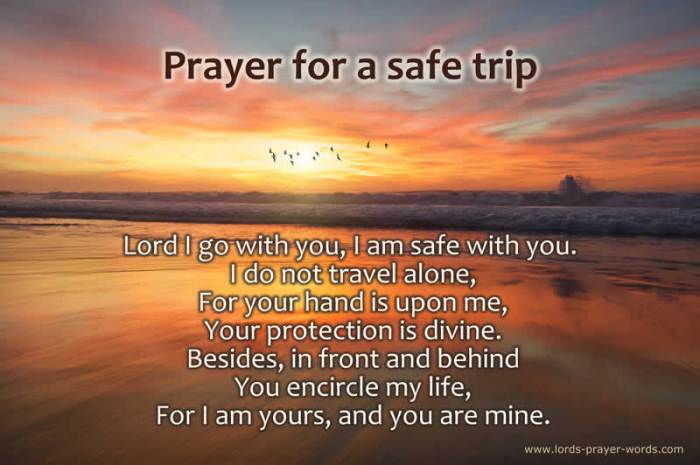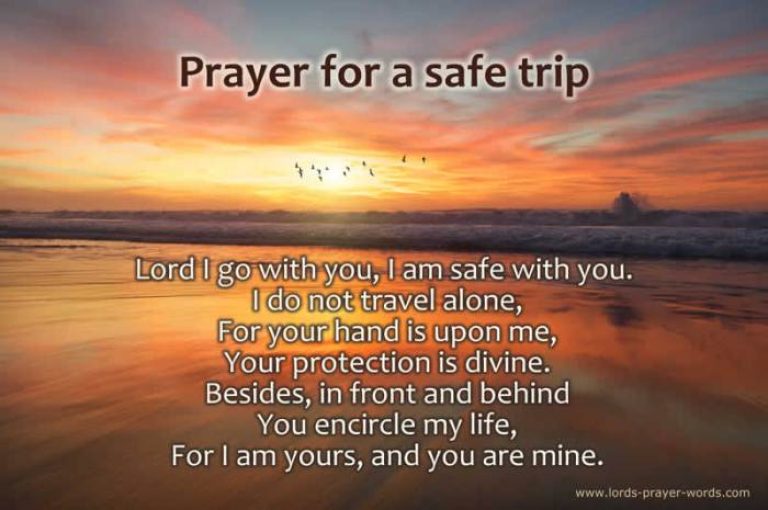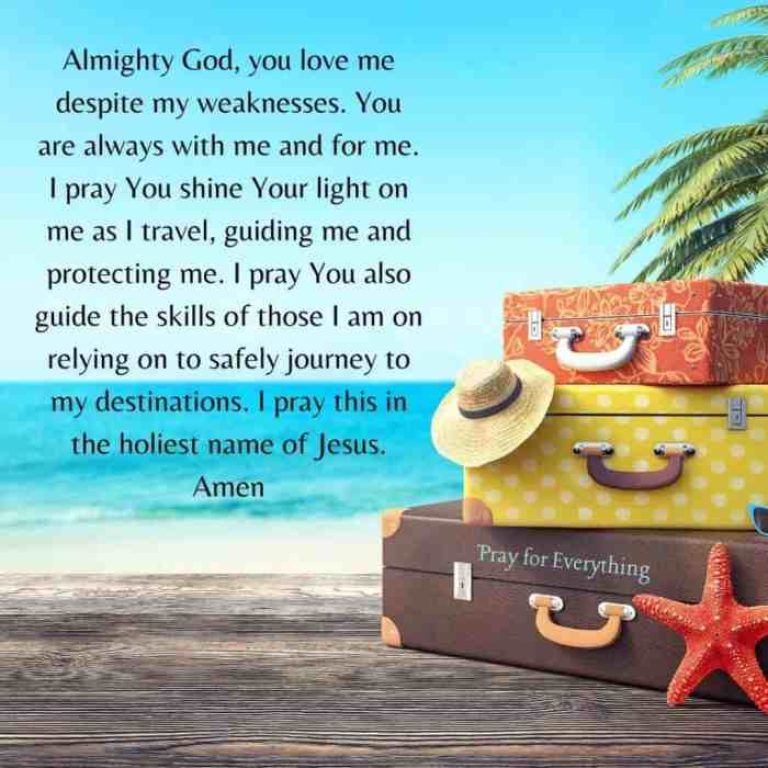Dua for travel, in Islam, is more than just a prayer; it’s a heartfelt connection with Allah, seeking His protection and guidance on your journey. This guide explores the significance of travel duas, offering practical advice on how to incorporate them into your travel plans, from pre-trip preparations to the journey itself. We’ll delve into common dua phrases, explore different types of travel duas based on your trip’s purpose, and uncover the spiritual benefits of seeking divine assistance during your travels.
We’ll cover everything from the proper etiquette for making dua—emphasizing sincerity and humility—to practical tips on integrating these prayers into your daily routine while traveling. Whether you’re embarking on a business trip, a pilgrimage, or a leisurely vacation, understanding the power of dua can transform your travel experience, offering peace of mind and a deeper connection with your faith.
Understanding Dua for Travel
Dua, in Islam, is the act of supplication or prayer to Allah. It’s a cornerstone of the Muslim faith, a deeply personal connection with the Divine. Making dua is believed to be a powerful way to seek Allah’s mercy, guidance, and help in all aspects of life, including travel. Travel, especially long journeys, often involves uncertainties and potential dangers, making dua particularly relevant and important for Muslims.The significance of seeking Allah’s protection and guidance during journeys stems from the belief that Allah is the ultimate protector and guide.
He is the one who controls all aspects of the journey, from the safety of the vehicle to the well-being of the traveler. By making dua, Muslims express their reliance on Allah and seek His help to ensure a safe and successful trip. It’s a way to acknowledge Allah’s power and sovereignty and to humbly request His assistance in navigating the challenges of travel.
Common Intentions in Travel Duas
Travel duas typically incorporate a range of intentions, reflecting the diverse needs and concerns of travelers. These intentions often include requests for safety, protection from harm, ease of travel, a smooth journey, and the ability to reach their destination safely and successfully. Many travelers also include requests for blessings and positive experiences during their journey, seeking spiritual growth and connection with Allah during their time away from home.
Some may also pray for the safety and well-being of their loved ones back home.
Examples of Supplications for Travel
Many commonly used travel duas are short and concise, easily memorized and recited throughout the journey. For example, a traveler might recite the following supplication before embarking on a journey:
“Allahumma inni as’aluka fi safari hadha husna safari wa husna iqamati wa husna raj’ati”
which translates to: “O Allah, I ask You for goodness in this journey of mine, goodness in my stay, and goodness in my return.” Other supplications might focus on specific aspects of the journey, such as praying for safe driving, a smooth flight, or protection from illness or accidents. The specific wording of the dua is less important than the sincerity and intention behind it.
The act of supplication itself is what holds significant spiritual weight.
Common Dua Phrases for Safe Travel: Dua For Travel

Safe travels are a blessing, and many Muslims turn to supplication (dua) to seek Allah’s protection and guidance during journeys. These duas express gratitude, seek safety, and ask for ease throughout the trip. Remembering to make sincere dua is a powerful way to enhance the spiritual aspect of travel.
The following table lists some common Arabic phrases used in duas for travel. Remember, the sincerity of your intention is paramount. These phrases offer a starting point for your own personal supplications.
Common Arabic Phrases for Travel Duas
| Arabic | Transliteration | Translation | Meaning/Context |
|---|---|---|---|
| اللَّهُمَّ إِنِّي أَسْأَلُكَ خَيْرَ السَّفَرِ وَخَيْرَ الْمَقْصِدِ | Allahumma inni as’aluka khayra as-safar wa khayra al-maqsid | O Allah, I ask You for the good of the journey and the good of the destination. | This dua seeks Allah’s blessing for a safe and successful journey, both in travel and in reaching the intended destination. |
| اللَّهُمَّ سَهِّلْ سَفَرِي هَذَا وَطَوِّلْ مَقَامِي | Allahumma sah-hil safarii hadha wa thawwil maqami | O Allah, make this journey easy for me and prolong my stay (at the destination). | This dua asks for ease and comfort during the journey and a pleasant stay at the destination. It’s particularly relevant for longer trips. |
| أَسْتَوْدِعُكَ نَفْسِي وَأَهْلِي وَمَالِي | Asta’udīku nafsi wa ahli wa mali | I entrust my soul, my family, and my possessions to Your care. | This dua is a powerful way to place your trust in Allah’s protection for yourself, loved ones, and belongings during travel. |
| اللَّهُمَّ رَبِّ السَّمَاوَاتِ وَالْأَرْضِ، مَنْ ذَا إِلَهُ إِلاَّ أَنْتَ، أَسْأَلُكَ أَنْ تُسَهِّلَ سَفَرِي، وَتُعِينَنِي عَلَيْهِ | Allahumma Rabbas samawati wal ard, man dza ilaha illa anta, as’aluka an tusahhila safari, wa tu’inani ‘alayh | O Allah, Lord of the heavens and the earth, there is no god but You. I ask You to ease my journey and help me with it. | This comprehensive dua acknowledges Allah’s sovereignty and directly requests ease and assistance throughout the journey. |
| اللهم إني أسألكَ السلامة في سفري و إيابي | Allahumma inni as’aluka s-salāma fī safarī wa īyābī | O Allah, I ask You for safety in my journey and return. | This dua focuses specifically on safe travel to and from the destination, highlighting the importance of a safe return. |
Different Types of Travel Duas
While the core intention of any travel dua is seeking Allah’s protection and assistance during a journey, the specific wording and emphasis can vary depending on the purpose and nature of the trip. Understanding these nuances can help you choose a dua that resonates most deeply with your situation and needs. Different journeys carry different potential risks and require different forms of divine assistance.Different types of travel Duas reflect the specific concerns and intentions associated with various journeys.
The phrasing and focus shift to align with the unique challenges and goals of each travel type. For instance, a pilgrimage will emphasize spiritual preparedness and acceptance of Allah’s will, while a business trip might focus on success and safe negotiations.
Travel Duas for Business Trips
Business trips often involve navigating unfamiliar environments, meeting new people, and facing potential challenges in negotiations or projects. A dua for a business trip would typically emphasize success in endeavors, safety during travel, and guidance in making sound decisions. It might include requests for clarity of thought, protection from harm, and ease in communication. A person might pray for a successful outcome of meetings and the ability to represent their company effectively.
The focus is less on spiritual growth and more on professional success within a safe and secure framework. An example could be a silent supplication asking for Allah’s blessings on the trip and for successful negotiations.
Travel Duas for Pilgrimage, Dua for travel
Pilgrimages, such as Hajj or Umrah, hold profound spiritual significance. Duas for these journeys focus heavily on spiritual preparation, acceptance of Allah’s will, and seeking His forgiveness and blessings. The emphasis is on performing the rituals correctly, maintaining a pious attitude, and gaining spiritual enrichment. Concerns revolve around physical and emotional well-being during the demanding journey and the successful completion of the pilgrimage’s spiritual requirements.
The phrasing often includes expressions of humility, gratitude, and a sincere desire to please Allah. A common phrase might be a heartfelt plea for acceptance of one’s Hajj or Umrah, and forgiveness for past shortcomings.
Travel Duas for Leisure Travel
Leisure trips, while less structured than business or pilgrimage, still require safety and protection. Duas for leisure travel often center on ensuring a smooth and enjoyable experience. They might include requests for safe travel, pleasant companions, and memorable experiences. The focus is on enjoying the journey, encountering positive people, and returning home safely. Concerns might include avoiding accidents, finding accommodation easily, and enjoying the sights and experiences.
A person might silently thank Allah for the opportunity to travel and ask for a safe and enjoyable journey.
The Etiquette and Practice of Making Dua

Making dua, or supplication, is a deeply personal and powerful act in Islam. It’s a direct connection with God, and approaching it with the right attitude and approach significantly increases its effectiveness. Proper etiquette ensures that your dua is received with acceptance and grace.The core principles of making dua revolve around sincerity, humility, and respect. Sincerity means making your dua with a genuine heart, believing in its potential to be answered.
Humility involves recognizing your dependence on God and acknowledging your unworthiness before Him. Respectful posture, typically involving lowering your gaze and perhaps raising your hands, demonstrates reverence for the divine.
Proper Posture and Attitude During Dua
Maintaining a respectful posture during dua is essential. This often involves standing with humility, hands raised towards the sky, and eyes lowered in reverence. However, there is flexibility; dua can be made while sitting or even lying down if one is ill or unable to stand. The key is to maintain a posture that reflects sincerity and respect, focusing your mind and heart on your request.
Imagine yourself standing before God, presenting your needs with complete honesty and humility. This inner attitude is far more important than the outward physical posture.
Choosing the Right Time and Place for Dua
The timing and location of your dua can also influence its acceptance. Certain times are considered particularly auspicious, such as during the last third of the night, just before dawn (Fajr prayer), or immediately after obligatory prayers. Similarly, choosing a quiet, clean place where you can focus without distractions can enhance your connection with God. Think of a serene space where you feel most comfortable expressing your thoughts and feelings to the divine.
This could be a quiet corner of your home, a peaceful natural setting, or even your car if you’re traveling and need to make a quick dua.
Situations Where Dua for Travel is Particularly Beneficial
Making dua before, during, and after travel is highly recommended. Before departure, a dua for safety, ease of travel, and a pleasant journey is incredibly beneficial. During the journey, dua can be made for protection from accidents, delays, and unforeseen difficulties. For example, if you experience a sudden storm or mechanical issue, making a heartfelt dua for assistance can bring peace and reassurance.
Upon arrival, expressing gratitude for a safe journey and seeking blessings for your destination demonstrates humility and appreciation for God’s grace. Consider making dua for the safety of your loved ones back home as well, ensuring their well-being while you are away.
Benefits and Spiritual Significance
Reciting travel duas offers significant spiritual benefits beyond the mere act of prayer. It’s a powerful way to connect with Allah (SWT) and seek His protection and guidance during journeys, fostering a sense of peace and tranquility even amidst the potential stresses of travel. The act itself strengthens one’s faith and reliance on God’s mercy.Making dua before, during, and after travel isn’t simply a ritual; it’s a profound spiritual practice.
It cultivates a mindset of dependence on Allah, acknowledging His omnipotence and control over all aspects of life, including the safety and success of one’s travels. This reliance fosters inner peace and reduces anxiety related to unforeseen circumstances, allowing for a more focused and spiritually enriching journey. The consistent practice of seeking divine guidance through dua deepens one’s connection with the divine and reinforces the belief in Allah’s unwavering protection.
Peace of Mind and Protection from Harm
The feeling of security and peace of mind derived from making dua before a journey is invaluable. The act of supplication itself can be incredibly calming, helping to alleviate travel-related anxieties. Many travelers report feeling a sense of comfort and confidence knowing they’ve sought Allah’s protection. This peace of mind isn’t merely psychological; it’s a tangible manifestation of faith, creating a spiritual shield against the potential challenges of travel.
Reciting specific duas for safety, like those mentioning protection from accidents or harm, further reinforces this sense of security. For example, the feeling of being divinely protected can be transformative, reducing stress and anxiety even during challenging travel situations like unexpected delays or inclement weather.
Enhanced Connection with Allah
Travel often presents opportunities for introspection and reflection. Reciting travel duas enhances this introspection by actively engaging with one’s faith. The repetitive act of supplication, coupled with the contemplation of one’s reliance on Allah, can deepen spiritual awareness. Even mundane aspects of travel, like long journeys or airport waiting, can be transformed into moments of profound spiritual connection through consistent dua.
This practice cultivates a continuous dialogue with the divine, making travel a journey not only across physical distances but also a journey of spiritual growth and closeness to God. The act of remembering Allah during travel, even through simple whispered prayers, strengthens the bond between the traveler and the divine.
Personal Anecdotes Illustrating Positive Effects
While specific personal accounts are inherently subjective, the common thread among numerous testimonies revolves around a sense of divine intervention. Many recount instances where unexpected delays were resolved miraculously, where potential dangers were averted, or where unexpected assistance arrived at crucial moments. For instance, a traveler might describe a situation where a seemingly impossible logistical problem was resolved just in time, or a near-miss accident was avoided, leading them to attribute it to the blessings of Allah (SWT) following their recitation of travel duas.
These experiences, though individual, collectively demonstrate the perceived power of dua in enhancing safety and well-being during travel. These narratives, though subjective, highlight the deep faith and trust many travelers place in the efficacy of dua.
Visual Representation of Dua for Travel
Visual representations of a dua for travel can powerfully enhance the spiritual experience and provide a tangible connection to the act of seeking divine protection and guidance. These visuals can take many forms, from simple illustrations to intricate calligraphy, each conveying a unique message and aesthetic appeal. Let’s explore two potential visual representations.
Illustration of a Person Making Dua
Imagine a softly lit scene, perhaps at dawn or dusk, with a traveler kneeling on a prayer rug placed on a slightly raised earthen platform overlooking a vast, open landscape. The sky is a blend of warm oranges and soft blues, hinting at both the journey’s beginning and the promise of a safe arrival. The traveler, dressed in simple, comfortable clothing – perhaps loose-fitting pants and a long-sleeved shirt – is depicted with their hands raised in supplication, their head bowed slightly in humility.
Their expression is one of peaceful serenity, reflecting both a sense of trust in God and a quiet anticipation of the journey ahead. The overall mood is one of hope and tranquility, conveying the feeling of surrender and reliance on divine protection. The background, with its expansive vista, symbolizes the journey itself, emphasizing the vastness of the undertaking and the need for divine guidance.
Details like the texture of the prayer rug, the subtle folds in the clothing, and the expression in the traveler’s eyes all contribute to a sense of realism and emotional depth.
Calligraphy of a Travel Dua
This visual representation takes the form of a meticulously crafted calligraphy piece, featuring a selected dua for travel written in elegant Arabic script. The style is a blend of traditional Thuluth and Naskh scripts, known for their graceful curves and clear readability. The colors are subdued and calming: a deep teal or indigo for the main text, complemented by accents of gold leaf highlighting key phrases or words.
The background is a simple, unblemished parchment-like surface, allowing the calligraphy to take center stage. Symbolic elements might include subtly incorporated imagery, such as a stylized depiction of a compass or a bird in flight, subtly integrated into the design without distracting from the central text. The overall effect is one of serene beauty and spiritual reverence, transforming the written dua into a work of art that invites contemplation and reflection.
The choice of script, colors, and symbolic elements all work together to create a visually stunning and spiritually meaningful representation of the dua, transforming a simple prayer into a piece of devotional art.
Reciting travel duas isn’t merely a religious practice; it’s a powerful way to infuse your journey with peace, protection, and a profound sense of connection with the divine. By understanding the significance of these prayers and integrating them into your travel preparations, you can embark on your adventures with a strengthened spirit and a sense of divine guidance. Remember, sincerity and humility are key, and the act of supplication itself offers a unique spiritual reward, regardless of the outcome of your trip.
So, next time you pack your bags, remember to pack your prayers too.
Clarifying Questions
Can I say a dua in any language?
While Arabic is preferred as it’s the language of the Quran, Allah understands all languages. Sincerity is key.
What if I forget a specific dua?
Any sincere prayer expressing your need for safety and guidance is acceptable to Allah. Just speak from the heart.
Should I say a dua before
-every* trip, even short ones?
Yes! Even short trips benefit from seeking Allah’s protection. It’s a good habit to develop.
Is it okay to ask for specific things in my travel dua, like a smooth flight?
Absolutely. Be specific in your requests, but remember to maintain humility and acceptance of Allah’s will.


